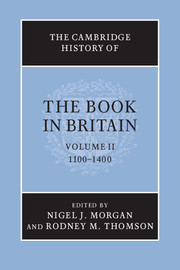Book contents
- Frontmatter
- Preface
- The roles of books
- Book production
- Readership, libraries, texts and contexts
- 9 Library catalogues and indexes
- 10 University and monastic texts
- 11 Law
- 12 Books for the liturgy and private prayer
- 13 Compilations for preaching and Lollard literature
- 14 Spiritual writings and religious instruction
- 15 Vernacular literature and its readership
- 16 History and history books
- 17 Archive books
- 18 Scientific and medical writings
- 19 Music
- 20 Illustration and ornament
- List of abbreviations
- Bibliography
- Photo credits
- General index
- Index of manuscripts
- Plates 1
- Plates 2
- References
16 - History and history books
from Readership, libraries, texts and contexts
Published online by Cambridge University Press: 28 November 2008
- Frontmatter
- Preface
- The roles of books
- Book production
- Readership, libraries, texts and contexts
- 9 Library catalogues and indexes
- 10 University and monastic texts
- 11 Law
- 12 Books for the liturgy and private prayer
- 13 Compilations for preaching and Lollard literature
- 14 Spiritual writings and religious instruction
- 15 Vernacular literature and its readership
- 16 History and history books
- 17 Archive books
- 18 Scientific and medical writings
- 19 Music
- 20 Illustration and ornament
- List of abbreviations
- Bibliography
- Photo credits
- General index
- Index of manuscripts
- Plates 1
- Plates 2
- References
Summary
Throughout our period history was written as well as made: the past, as far back as Creation, was remembered, and the present recorded. Indeed, paradoxically from our view point, what excited most writers was what was happening in their day; the distant past, if it was noticed at all, was dealt with rather perfunctorily. The literature is so abundant that in this chapter we shall by no means be able even to name all the writers who participated, or any but the most important anonymous works. We shall for the most part be content to note trends, tendencies, motives and contexts. At its widest, historical writing encompassed the history of the kingdom of England, and at its narrowest, the fortunes of a single community, usually religious. As a genre, however, this literature is hard to demarcate. It cannot, and ought not to, be clearly distinguished, for instance, from hagiography, from collections of legal or administrative documents with linking and interpretative commentary, or from romance. Medieval writers themselves sometimes made such distinctions, but very often did not observe them. The twelfth and thirteenth centuries mark one of the greatest epochs in the long tradition of historical writing in Britain, both qualitatively and quantitatively. In the fourteenth and fifteenth centuries, this tradition waned and historical writing simply lost significance as a literary genre. One reason for this was doubtless the fact that it was no longer the preserve of authors who had received a thorough education in the liberal arts and who thus understood the classical historiographical and literary norms.
- Type
- Chapter
- Information
- The Cambridge History of the Book in Britain , pp. 397 - 415Publisher: Cambridge University PressPrint publication year: 2008
References
- 5
- Cited by

